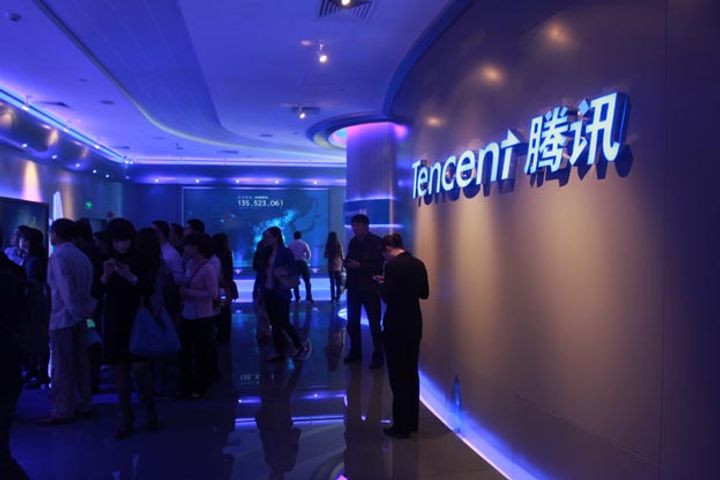 Tencent Spent USD27 Bln in First Seven Months on Social E-Commerce Startups
Tencent Spent USD27 Bln in First Seven Months on Social E-Commerce Startups(Yicai Global) Aug. 3 -- Tencent Holdings has gradually shape-shifted into a venture capitalist in recent years, with investments in a multitude of startups, prioritizing the social media e-commerce in which it excels.
The Shenzhen-based tech titan invested a total of CNY187.5 billion (USD27.4 billion) in 93 companies from the start of this year to Aug. 1, sticking its fingers into an array of pies in e-commerce, enterprise services, transport, logistics, culture, entertainment and education, all with an emphasis on community-centered e-commerce, information from third-party data service provider ITjuzi shows.
Tencent decanted up to CNY54 billion into other companies in this quarter, more than double its net profits (CNY23.3 billion) in the same period, its earnings report for the first quarter shows.
Investment projects that can counterbalance its nemesis Alibaba Group Holding are very likely to be a choice for the company, a source close to Tencent told Yicai Global.
"Tencent tends to choose WeChat-backed or traffic-based companies that are able to monetize its traffic as its investment targets, such as those in videos, games, e-commerce and advertisements, despite the breadth of such fields," said Zhang Yi, chief executive officer of mobile internet business iiMedia Research Group, in an interview with Yicai Global.
Among the overwhelming number of outbound investments Tencent made in the first half, community-centered e-commerce projects on which the company bet heavily stood out: mini app e-commerce platform SEE Xiaodianpu, men's wear brand HLA, cross-border shopping platform Camelia, mini-program e-commerce platform Haowumancang, online group seller Pinduoduo, mobile ordering app Huixiadan, online second-hand book shop Duozhuayu, lifestyle platform Xiaohongshu, mobile e-commerce solution provider Youzan and clothing platform Haoyiku have all reportedly or announced they have obtained capital from Tencent.
Its investment in Pinduoduo was the largest of its kind by Tencent in the first half, public information shows. Tencent acquired a 9 percent stake in group buying company Pinduoduo for USD1 billion, it stated in its first-quarter earnings report. When Pinduoduo later listed on Nasdaq, Tencent fed another USD250 million to the unicorn.
Pinduoduo arose as a dark horse that upset the apple cart in an e-commerce sector previously largely divvied up between Alibaba and JD.Com. The upstart recorded a gross merchandise volume of more than CNY100 billion within two years since its inception. In contrast, it took 15 and five years for JD.Com and Taobao to reach this target, respectively.
Pinduoduo thrives on the WeChat ecology where buyers send group buying links to their WeChat groups, through which Pinduoduo strives to woo users at extremely low cost and grow its scale.
Tencent led the latest financing round of Haoyiku, which formed less than a year ago. The typical community-centered e-commerce platform also uses the social network-based WeChat friend circles built by Tencent as its primary distribution channel.
Recent years have logged increasingly higher costs for online user acquisition amid fierce competition between Tencent and Alibaba for offline retail shops until the emergence of community-centered e-commerce offered the two another way to win over users. Social networks like WeChat can tap into pools of users from third- and fourth-tier cities and those in the countryside.
E-commerce used to be a weak link among all Tencent's businesses, but community-centered e-commerce has now developed into a powerful weapon for it to wield to win.
No other internet company can compare with Tencent in investment scale, while no other investment firm owns as consummate an internet infrastructure.
It boasts infrastructure that all internet startups find necessary to rely on, but capital injection from Tencent also brings with it other implications for these toddlers. Credit endorsement, strategic cooperation and traffic access, as well as relatively independent development.
Tencent has never interfered with their businesses, the managers of a slew of startups obtaining investments from the web colossus told Yicai Global.
His former work experience at Tencent and his later entrepreneurial efforts gave Zhao Ming (not his real name) the feeling that Tencent would not meddle in the affairs of its investment target. The company is committed to providing a platform for all other firms on an equal footing no matter whether it has a stake in them or not, Zhao, who previously worked on Tencent's WeChat team, told Yicai Global.
The company always affords equal treatment to all other firms, Tian Jiangxi, deputy general manager of Tencent's Intelligent Retail Strategic Cooperation Department, told Yicai Global, adding that "Tencent is using similar resources and ideas to push all firms forward."
Jeffrey Li, managing partner of Tencent Investment, the company's corporate venture capital platform, once jokingly called it "a strategic investor most resembling a financial investor."
That said, nothing can create a closer partnership than real money support. For instance, a source close to game-streaming platform Huyatold Yicai Global that, above and beyond its financial support, Tencent also signed a business cooperation agreement with the latter, including strategic collaboration on live game streaming and game-related businesses.
The irony here is that in an essay appearing in May titled'Tencent Has Lost Its Dream'one WeChat user employed the tech titan's own messaging and third-party payment apptorebukeit forlosing its power to innovate and using investments to grow its business instead in a harangue that events now seem to substantiate.
Editor: Ben Armour